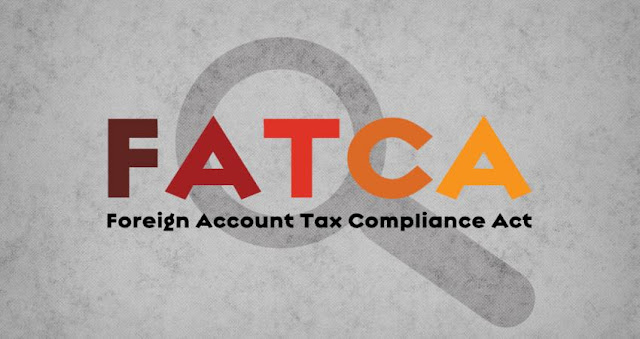Recently one of my friend, working for an IT company in the USA on H1B visa received notification from Indian banks and Mutual funds that he needs to submit FATCA compliant certificates. He wasn't sure about what is FATCA and why he needs to submit FATCA certificate to Indian banks. This inspired me to write this short post explaining what is FATCA and who needs to submit FATCA certificates in India.
Well, FATCA stands for Foreign Account Tax Compliance Act (FATCA), introduced by US tax authorities to crack down on tax evaders. Since, India and United States has signed a treaty to share information about US citizens and permanent residents i.e. NRIs working in the USA on H1B or L1 VISA and who own properties, bank accounts and other investments in US and India.
As per the new regulations, NRIs living in USA e.g. US citizens or those working in the US on H1B visa would need an FATCA-compliance certificate to be submitted to their banks. The same certificate needs to be provided to also mutual funds and before making direct investment in the capital market.
Banks including Kotak Mahindra Bank, ICICI, HDFC, YESBANK, Bank of Baroda and State Bank of India, as well as mutual funds like ICICI Prudential Mutual fund, SBI Mutual, Axis Mutual and DSP Blackrock have also asked their customers to submit the FATCA certificates.
If you are a US citizen or an Indian working in USA on H1B or L1 VISA, you must submit FATCA certificate to your Indian bank and Mutual fund house. US citizens who don't give these declarations would not be able to invest or keep money in India e.g. on NRE, FCNR, or NRO accounts.
If you know, you need to pay tax in the USA on your global income. US-based NRIs who have bought real estate or made other investment in India could be taxed as per the US taxation laws. In the worst case, many Indian banks would be well within their rights to even freeze accounts of clients based in India who do not submit FATCA-compliant certificates.
In short, if you are a US citizen who keeps money in India e.g. NRE accounts opened by OCI card holders, or bought property in India, or have investment in Indian Stock Market via Mutual fund or buying stock using a brokerage account, you must submit FATCA compliant certificates to your Indian bank and mutual fund house. This also applies to Indian working in the USA on H1B or L1 VISA and considered as a tax resident for income tax purpose.
Well, FATCA stands for Foreign Account Tax Compliance Act (FATCA), introduced by US tax authorities to crack down on tax evaders. Since, India and United States has signed a treaty to share information about US citizens and permanent residents i.e. NRIs working in the USA on H1B or L1 VISA and who own properties, bank accounts and other investments in US and India.
Who needs to submit FATCA Certificates in India
As per the new regulations, NRIs living in USA e.g. US citizens or those working in the US on H1B visa would need an FATCA-compliance certificate to be submitted to their banks. The same certificate needs to be provided to also mutual funds and before making direct investment in the capital market.
Banks including Kotak Mahindra Bank, ICICI, HDFC, YESBANK, Bank of Baroda and State Bank of India, as well as mutual funds like ICICI Prudential Mutual fund, SBI Mutual, Axis Mutual and DSP Blackrock have also asked their customers to submit the FATCA certificates.
What is the impact of not submitting FACTA Certificate to Indian banks
If you are a US citizen or an Indian working in USA on H1B or L1 VISA, you must submit FATCA certificate to your Indian bank and Mutual fund house. US citizens who don't give these declarations would not be able to invest or keep money in India e.g. on NRE, FCNR, or NRO accounts.
If you know, you need to pay tax in the USA on your global income. US-based NRIs who have bought real estate or made other investment in India could be taxed as per the US taxation laws. In the worst case, many Indian banks would be well within their rights to even freeze accounts of clients based in India who do not submit FATCA-compliant certificates.
In short, if you are a US citizen who keeps money in India e.g. NRE accounts opened by OCI card holders, or bought property in India, or have investment in Indian Stock Market via Mutual fund or buying stock using a brokerage account, you must submit FATCA compliant certificates to your Indian bank and mutual fund house. This also applies to Indian working in the USA on H1B or L1 VISA and considered as a tax resident for income tax purpose.

